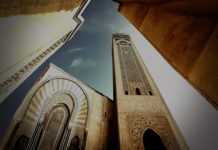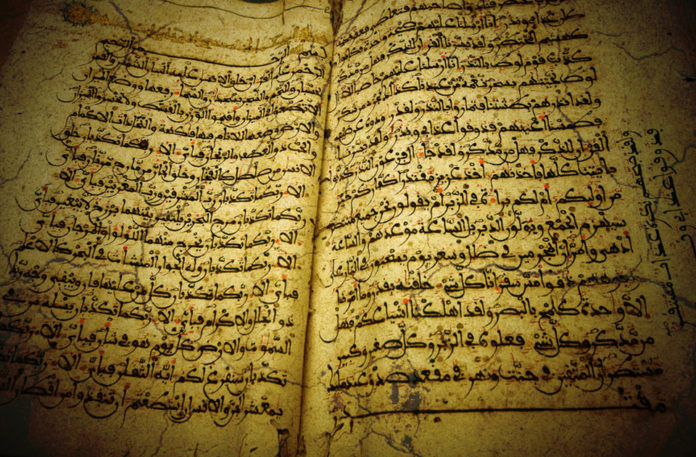Al-Qadar is Allahs predestination of measurements and sustenance of everything and everyone, according to His Knowledge and Wisdom.
Aspects Of Belief In Al-Qadar
1. Knowledge – The belief that Allah’s Knowledge encompasses everything, every matter, major or minor, and time frames of everything that happens in this universe. Allah’s Knowledge encompasses all of His Actions and actions taken by His slaves.
2. Writing – The belief that Allah recorded everything in a Book that He kept with Him, called Al-Lawh Al-Mahfoodh (The Preserved Book). He said, what translated means,
| Know you not that Allah knows all that is in heaven and on earth? Verily, it is (all) in the Book (Al-Lawh Al-Mahfooth). Verily, that is easy for Allah. [Al-Haj 22:70] |
Abdullah-ibn-Amr-ibn-al-Aas (radiyAllahu anhuma) said that he heard the Messenger of Allah ﷺ said, what translated means,
| Allah recorded the measurement of all matters pertaining to Creation fifty thousand years before He created the heavens and earth. [Saheeh Muslim] |
3. The belief that nothing, whether related to Allah’s Actions or actions taken by His slaves, can happen without His Permission. He said, what translated means,
| And your Lord Creates whatsoever He wills and chooses. [Al Qasas 28:68] |
| And Allah does what He will. [Ibraheem 14:27] |
and,
| He it is Who shapes you in the wombs as He pleases. [Ali-Imraan 3:6] |
As for actions taken by His creation, Allah said,
| Had Allah willed, indeed He would have given them power over you, and they would have fought you. [An-Nisa’a 4:90] |
and,
| And if Allah had willed, they would not have done so. So leave them alone with their fabrications. [Al-Ana’am 6:137] |
4. The belief that Allah created all creation, all what they possess of attributes and all their actions,
| Allah is the Creator of all things, and He is the Guardian over all things. [Az-Zumar 39:62] |
and,
| He has created everything, and has measured it exactly according to its due measurements. [Al-Forqan 25:2] |
Also, Abraham said to his people, as was mentioned in the Quraan,
| While Allah has created you and what you make. [As-Saaffaat 37:96] |
Believing in the Al-Qadar, as described above, does not mean that people have no power over the actions they chose to take. Islamic Shariah and Reality confirm that the person has a will of his own:
As for the Shariah, Allah said about ones own will, what translated means,
| So, whosoever wills, let him take a Return to his Lord (by obeying His Commandments). [An-Naba’ 78:39] |
and,
| So go to your tilt (have sexual relations with your wives) when and how you will (not in the anus). [Al-Baqara 2:223] |
As for ones own power over his actions,
| So keep your duty to Allah as much as you can; listen and obey. [At-Taghaabun 64:16] |
and,
| Allah burdens not a person beyond his scope. He gets reward for that (good) which he has earned, and he is punished for that (evil) which he has earned. [Al-Baqara 2:286] |
As for the Reality of things, every human knows that he has a power and a will of his own. He uses his power and will to indulge in or avoid actions of his choice. Mankind distinguish between what they do by their own power and between what they have no power over, like shivering due to illness or extreme cool. However, the power and will of mankind is under the control of Allahs Will and Power,
| To whomsoever among you who wills to walk straight. And you will not, unless (it be) that Allah wills, the Lord of the worlds. [At-Takweer 81: 28-29]. |
The universe is Allah’s property and nothing happens in His Kingdom without His Knowledge and Permission.
Belief in Al-Qadar, as explained above, does not provide an excuse for mankind to sin or abandon what they are obligated to do. This excuse can be rejected using the following arguments:
1. Allah said, what translated means, Those who took partners (in worship) with Allah will say:
| If Allah had Willed, we would not have taken partners (in worship) with Him, nor would our fathers, and we would not have forbidden anything (against His Will). |
Likewise bellied those who were before them, till they tasted of Our Wrath. Say:
| Have you any knowledge (proof) that you can produce before us? Verily, you follow nothing but guess and you do nothing but lie [Al-Ana’am 6:148] |
The disbelievers did not have a valid excuse when they said that what they did was according to Al-Qadar. If this excuse was valid, then why will Allah punish them for their sins?
2. Allah said, what translated means,
| Messengers as bearers of good news as well as of warning in order that mankind should have no plea against Allah after the Messengers And Allah is Ever All-Powerful, All-Wise. [An-Nisaa 4:165] |
Sending down the Messengers took place according to Al-Qadar, also. This is why the disbelievers cannot use Al-Qadar as an excuse for not believing, because Al-Qadar provided them with the means to escape Allah’s punishment by following His Messengers.
3. Ali-ibn-Abi Talib (radiyAllahu anhu) said that the Prophet ﷺ said, what translated means,
| One’s final destination, in Hell or Paradise, is already determined for each one of you. A man said, Should we depend (on this fact), O Messenger of Allah ﷺ (meaning to abandon working deeds)? He ﷺ said, No. Perform deeds, because everyone will be helped (to go on the path that he chooses and reach his destiny). Then he read the Ayah.
|
4. Allah conveyed His Commandments to His slaves and did not require them to do what is beyond their capacity.
| So keep your duty to Allah (and fear Him) as much as you can. [AtTaghaabun 64:16] |
and
| Allah burdens not a person beyond his scope. [Al-Baqara 2:286]. |
If the slave is forced to do whatever deeds he performs, then Allah would have required from him what is beyond his capacity, and this is a false belief. For this reason, Allah forgives sins that take place because of ignorance or forgetfulness.
5. Al-Qadar is a matter of Allah’s Knowledge. No one can uncover his own Qadar but after it happens. Ones intention to perform a deed precedes the action itself. He does not know what Al-Qadar holds for him. Therefore, Al-Qadar is not a valid excuse for sinning and abandoning the Commandments.
6. One always seeks what is convenient for him. No one of sane mind would abandon what brings material benefit to him, saying that Al-Qadar forced him to take this course of action. Therefore, why would one use Al-Qadar as an excuse for abandoning what brings benefit to him in matters of religion and not do the same for matters of life?
If a man has to choose between two countries to move to, one of them is chaotic, full of incidents of murder, looting, rape, insecurity and hunger. Would he choose to go to this country or would he go to another country, which is safe for him and secure, with abundance in material joys, where ones honor, possessions and human rights are preserved? There is no doubt that this man would choose the second country, where he will be safe and secure. No one of sane mind would choose to go to the first country, claiming that this is his Qadar.
Therefore, why would one choose what ends him up in Hell, rather than Paradise, in the Last Life, claiming that this is his Qadar?
When one is sick and is given a medicine to take, he will take the medicine even though he does not like its taste. When one is told to go on a diet, he would not eat the food that he likes, in order to satisfy this diet and to stay fit. No one of sane mind would refuse to take medicines or go on medical diets, claiming that this is his Qadar. Therefore, why would one abandon implementing Allah’s and His Messenger’s ﷺ Commandments, thus bringing Allah’s Wrath on him, claiming that this is his Qadar?
7. If one of those, who abandon the Commandments and indulge in sinning, comes under attack on his honor or possessions, would he accept the excuse of the attacker, if he says that he attacked him because it was his Qadar to attack him, and therefore he is not to be blamed? Indeed No! Therefore, why does this person refuse Al-Qadar as an excuse for whoever attacked him, while he depends on Al-Qadar as an excuse for abandoning Allah’s rights on him?
It was reported that Omar ibn Al-Khattab (radiyAllahu anhu) was brought a man who was caught stealing. Omar ordered that this man’s hand be cut off. The man said,
| Wait, O leader of the believers. I only stole because this was in the Qadar of Allah. |
Omar said,
| And we are cutting your hand because it is in the Qadar of Allah. |
Benefits Of Belief In Al-Qadar
1. Depending on Allah alone when one indulges in any action. Taking the necessary precautions is not the cause of ones success in the intended actions. All matters are under the full control of the Qadar of Allah.
2. When one succeeds in performing an action, he must not be proud of himself. All good deeds are successfully performed because of Allah’s bounty, because He ordained that this matter to be successful. To be proud will make one forget to thank Allah for permitting him to successfully perform this deed.
3. Believing in Al-Qadar leads one to feel satisfied, safe and secure. All incidents that happen to a person are a result of Allah’s Qadar. One should not feel miserable for losing or not gaining what he likes. All this happens according to the Qadar of Allah. Allah is the King and Lord of the heavens and earth and His Qadar will happen exactly as He Will,
| No calamity befalls on the earth or in yourselves but is inscribed in the Book of Decrees (Al-Lawh Al-Mahfooth), before We bring it into existence. Verily, that is easy for Allah. In order that you may not be sad over matters that you fail to get, nor rejoice because of that which has been given to you. And Allah likes not prideful boasters. [Al Hadid 57:22-23] |
The Prophet ﷺ said, what translated means,
| Pleasing is the attitude of the believer. All of his matters are righteous. This is only for the believer. If a joy is brought to him, he thanks (Allah for it). This is better for him. If a calamity befalls him, he is patient. This is also good for him. [Saheeh Muslim] |
Two groups fell into misguidance with regard to Al-Qadar:
1. Al-Jabriyyah – This group claimed that the person is forced to do whatever he does and that he has no power or will of his own.
2. Al-Qadariyyah – They claimed that the person has a will and power independent of Allah’s Will and Power.
The Shariah and Real Life are used to refute the first group, Al-Jabriyyah.
As for the Shariah, Allah confirmed that humans have a will and power of their own,
| “Among you are some that desire this world and some that desire the Hereafter.” [Ali-Imraan 3:152] |
And say:
| The Truth is from your Lord. Then whosoever wills, let him believe, and whosoever wills, let him disbelieve. Verily, We have prepared for the unjust, a Fire whose walls will be surrounding them. [Al-Kahf 18:29] |
and.
| Whosoever does righteous, good deeds, it is for (the benefit of) his own-self and whosoever does evil, it is against his own-self, and your Lord is not at all unjust to (His) slaves. [Fussilat 41:46] |
As for Real Life, everyone knows the difference between his actions, like eating, drinking, selling and buying, and between what is beyond his power, like shivering and accidentally falling off a roof, for example. The first types of actions are his. He chooses them on his own will using his own power. The second types of actions are beyond his control.
The Shariah and The Mind are also used to refute the second group, Al-Qadariyyah.
As for the Shariah, Allah created everything and nothing happens without His permission. He said that all actions taken by His slave happen by His Will,
| Allah had willed, succeeding generations would not have fought against each other, after clear Verses of Allah had come to them, but they differed, some of them believed and others disbelieved, If Allah had willed, they would not have fought against one another, but Allah does what He likes. [Al-Baqara 2: 253] |
and,
| And if We had willed, surely! We would have given every person his guidance, but the Word from Me took effect (about evildoers), that I will fill Hell with Jinn and mankind together. [As-Sajda 32:13] |
As for The Mind, the universe is Allah’s Kingdom and mankind are a part of this Kingdom. Therefore, all mankind are owned by Allah. The slave cannot do anything in this Kingdom unless its Lord, Allah, gives him permission.
Footnote
Adapted from wathakker.info
(NOTE: If you want to build a strong and powerful relationship with Allah, check out Islamia TV, where you can watch Islamic speakers from across the globe deliver inspiring and motivational courses. Learn more at www.islamia.tv.)
















































